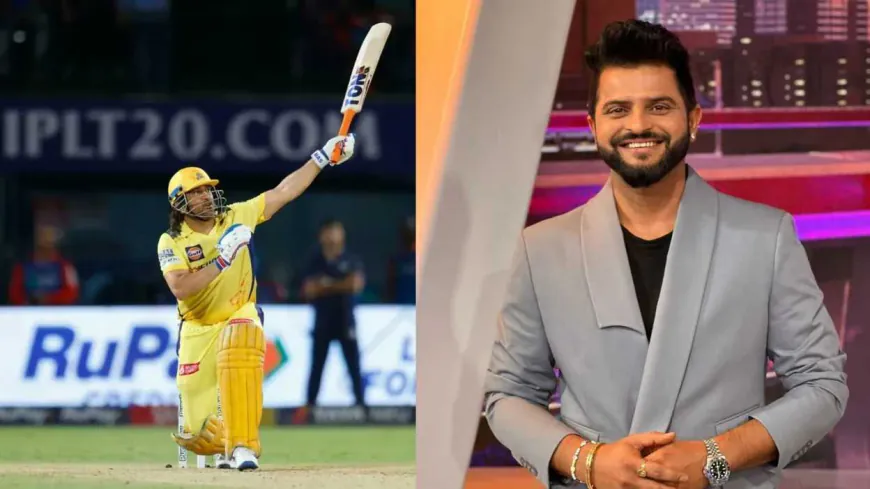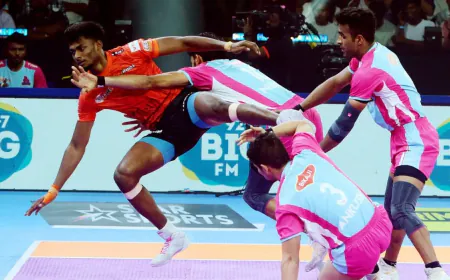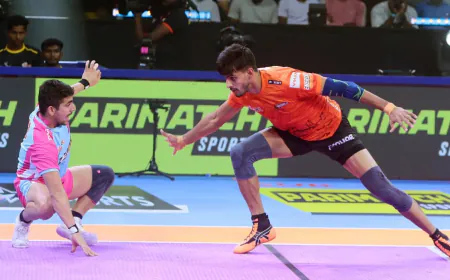The Dhoni Review System-Suresh Raina's Tribute to Thala's Masterminding Brilliance in India's 2013 Champions Trophy Victory
Suresh Raina tribute to MS Dhoni's masterminding excellence, terming it "The Dhoni Review System," while reminiscing over India's 2013 Champions Trophy triumph.

India's victory in the ICC Men's Champions Trophy 2013 was a mythical milestone in the history of cricket. Their winning path intact and a comprehensive eight-wicket victory over the West Indies in the group stages indicated their dominance. However, beyond the stellar performances on the field, it was MS Dhoni’s leadership that proved to be the defining factor in India’s triumph. His sharp instincts, tactical brilliance, and unwavering confidence in his players played a pivotal role in scripting history.
Recently, former Indian cricketer Suresh Raina revisited this memorable campaign in a special episode of The Suresh Raina Experience: Champions Trophy Special on JioHotstar. He shared his deep admiration for Dhoni’s leadership and how it played a crucial role in shaping India’s strategy. Most notably, he shed light on the origins of what is now referred to as the 'Dhoni Review System' (DRS) and how it cemented Dhoni’s reputation as one of the sharpest cricketing minds.
The Birth of the Dhoni Review System
The conditions at The Oval, a traditionally batting-friendly pitch, and the unpredictable weather in Wales played a key role in determining the team’s tactics. Dhoni’s impeccable judgment in reviewing umpiring decisions became a game-changer. According to Raina, every Decision Review System (DRS) call that Dhoni made was spot on, shifting the momentum in India’s favor.
"He had the natural sense of when to pitch for the review," Raina explained. "If it was a overcast day, he used that as an allowance. If the wicket was holding differently, he adjusted to that. Understanding the game as he was able and calling correctly made a big impact."
The impact of Dhoni extended even beyond his calls of review. Field placement by Dhoni placed India at all times at a position from where they were in a position to snatch the game away. Raina recalled how Dhoni strategized outcoming field positions, keeping the other side under pressure. "Observe him behind the wickets, always at the thick of action. The magnificence was his attacking field positions. He would place Virat Kohli in the slips, Ashwin at leg slip, and himself standing behind the stumps, controlling the game as a chess mastermind," Raina noted.
The Role of Spin and the Masterstroke of Jadeja
Another one of the key aspects of the Indian bowling was relying on the spinners from Dhoni. Ravindra Jadeja took top honors against West Indies and recorded 5 wickets at the cost of 36 runs. Raina complemented Dhoni on thinking ahead to utilizing Jadeja suitably, especially where spinners could be made vulnerable.
"Jadeja was match-winning touch that season in all forms. If the pitch was dry, he was even more lethal. His balls were short and snappy, and it was difficult for the batsmen to counter," Raina explained. "MS understood that if Jaddu could hit the stumps from at least 35-40 balls out of 60, he would take wickets. And he did just that."
Not just Jadeja, but even R. Ashwin played a key role in applying pressure. Dhoni’s decision to challenge the opposition to take on his spinners instead of relying solely on pacers was a masterstroke that reaped rich dividends.
Utilizing Part-Time Bowlers-Dhoni’s Unconventional Strategy
Another aspect of Dhoni’s captaincy that Raina highlighted was his ability to extract crucial overs from part-time bowlers. In the match against the West Indies, Virat Kohli chipped in with a few overs—a move that underlined Dhoni’s tactical flexibility.
"Virat is a great batsman, but he too used to love bowling at that time. Slow-medium bowlers are effective in England, and Dhoni knew it," Raina said. "MS used to have the capability of using the part-timers efficiently. He would just call us and say come here, Virat, come here. Rohit, come here. Raina, come here." Next thing we knew, we had bowled ten crucial overs between us."
This was particularly useful in the handling of the workload of frontline bowlers. India possessed a strong bench bowling with Ishant Sharma, Umesh Yadav, Bhuvneshwar Kumar, R. Ashwin, and Ravindra Jadeja. However, Dhoni ensured that there was always an alternative plan. His skill in not revealing anything to the opposition and making the best out of available resources was unparalleled.
The Leadership Legacy of Dhoni in the 2013 Champions Trophy
India's victory in the 2013 ICC Champions Trophy was not a question of individual brilliance but a tactically shrewd, well-balanced approach under MS Dhoni. His ability to build a winning team, play by the conditions, and provide confidence to his teammates made all the difference.
As Raina reminisced, “Dhoni’s leadership wasn’t just about tactics; it was about belief. He knew how to extract the best out of every player, whether it was a specialist bowler or a part-time option. His presence behind the stumps was like having a second coach on the field.”
The win against West Indies in the group stage was an illustration of India's superior planning and execution. From the precise DRS calls of Dhoni to his immaculate field placements, every decision helped to win the title. The 'Dhoni Review System' legacy continues to be debated today, an indication of the brilliance of a captain who led with clarity, composure, and confidence.
India's Champions Trophy triumph in 2013 is among the most historic achievements of cricket for India, and at its core was MS Dhoni—the master tactician who flipped the script in favor of India with his unparalleled leadership.




















































